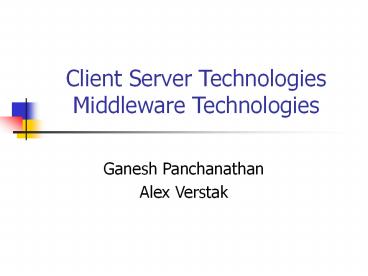Client Server Technologies Middleware Technologies - PowerPoint PPT Presentation
Title:
Client Server Technologies Middleware Technologies
Description:
Client Server Technologies Middleware Technologies Ganesh Panchanathan Alex Verstak Overview Ganesh Client/Server technologies Middleware Alex DirectExchange Sequoia ... – PowerPoint PPT presentation
Number of Views:180
Avg rating:3.0/5.0
Title: Client Server Technologies Middleware Technologies
1
Client Server TechnologiesMiddleware Technologies
- Ganesh Panchanathan
- Alex Verstak
2
Overview
- Ganesh
- Client/Server technologies
- Middleware
- Alex
- DirectExchange
- Sequoia 2000
- 3-Tier Architecture on the Grid
3
Computing models
- Terminal host model
- File sharing model
- Client/Server model
- Peer to Peer model
4
Client/Server model
- Client/server model is a concept for describing
- communications between computing processes
- that are classified as service consumers
(clients) - and service providers (servers).
- 2 Tier
- 3 Tier
- N Tier
5
Two Tier C/S Architecture
- Layers
- Clients
- Servers
- Functionalities
- User Interface Client
- Business Logic Client (Server??)
- Database management Server
6
3 Tier C/S Architecture
- Presentation Tier
- Business Tier
- Database Tier
7
2 Tier vs. 3 Tier
- Modularity
- Change management
- Reuse
- Performance
- Scalability
- Multiple data sources
- ????
8
Example N-Tier Architecture
J2EE Application Model
9
Middleware
- Middleware is a class of software
- technologies designed to help manage
- the complexity and heterogeneity
- inherent in distributed systems.
10
Middleware
11
Middleware
- Enable multiple processes interact across a
network - Between Apps and OS/Network services
- More functional API for
- Heterogeneity
- Location transparency
- Reliability
- Scalability
12
Types of middleware
- Middleware can take the following forms
- Remote procedure call
- Object request broker
- Transaction Processing monitor
- Message oriented middleware
13
Transaction
- A Transaction means a sequence of
- information exchange and related work
- (such as database updating) which is
- treated as an unit for the purposes of
- satisfying a request and ensuring
- database integrity.
14
Examples of transactions
- Purchase online using credit card
- Withdraw money from ATM
- Electronic funds transfer
- Book an airline ticket
- Ordering in Inventory management
- Billing for phone calls
15
Transactional Integrity - ACID
- Atomicity
- Trans. must be done or undone completely
- Consistency
- One consistent state to another
- Isolation
- Each trans. must be independent of others
- Durability
- Completed transactions are permanent
16
Transaction Processing Monitor
- Monitors a transaction as it passes
- through the different stages to
- Guarantee integrity of transaction
- Runtime resource management
17
TP Monitors
- Clients connect to the TP monitor
- TP Monitor
- Accepts transactions
- Queues them
- Takes responsibility till they are finished
- Two types
- TP Heavy
- TP Lite
18
Features
- Maps requests to controlled set of processing
routines for performance - Ability to update multiple DBMSs in a single
transaction - Connectivity to flat files, non relational DB and
legacy data - Prioritize transactions
19
Vendor Implementations
- Tuxedo by BEA
- JTS by Java
- MTS by Microsoft
- CICS by IBM
20
Message Oriented Middleware
- Messaging is an asynchronous method of
- passing information between processes
- across network
- across platform and OS
21
Message Oriented middleware
- Message Self contained object
- Message header address, id, priority
- Body of the message
- Message is intelligent when compared to a
transaction in TP systems. - In TP systems
- Transactions are just packets
- Intelligence to handle them is in monitor
22
Message Oriented Middleware
23
Features of MOM
- Primarily asynchronous communication
- Point to multi-point
- Ordered delivery
- Receipt notification
- Handling duplicates
- Message queues FIFO or priority basis
- Messages persistent or non-persistent
24
Point to point messaging
- Client may be only sender, only receiver or both
- Single receiver
- Use of a message queue
25
Publish Subscribe messaging
- Free sender from knowing the receivers
- Messages are categorized on topics
- List of senders/receivers is dynamic
26
Vendor Offerings
- MQSeries by IBM
- JMS by Java
- MSMQ by Microsoft
- DECMessageQ by BEA
27
References
- Client/Server
- http//edocs.bea.com/tuxedo/tux80/atmi/intbas3.htm
- http//www.sei.cmu.edu/str/descriptions/clientserv
er.html - http//www.sei.cmu.edu/str/descriptions/threetier.
html - Middleware
- http//www.sei.cmu.edu/str/descriptions/middleware
.htm - http//www.eecs.wsu.edu/bakken/middleware.pdf
- http//www.execpc.com/gopalan/mts/msmq.html
- http//proj-cmw.web.cern.ch/proj-cmw/workshop/mom.
pdf































